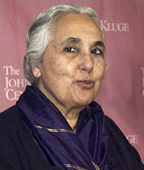Romila Thapar
| Romila Thapar | |
|---|---|
 |
|
| Born |
30 November 1931 Lucknow, British India |
| Nationality | Indian |
| Alma mater |
Panjab University School of Oriental and African Studies, University of London |
| Occupation | Historian, Writer |
| Known for | Authoring books about Indian history |
Romila Thapar (born 30 November 1931) is an Indian historian whose principal area of study is ancient India. She is the author of several books including the popular volume, A History of India, and is currently Professor Emerita at Jawaharlal Nehru University (JNU) in New Delhi. She has twice been offered the Padma Bhushan award, but has declined both times.
After graduating from Panjab University, Thapar earned her doctorate under A. L. Basham at the School of Oriental and African Studies, the University of London in 1958. She was a reader in Ancient Indian History at Kurukshetra University between 1961 and 1962 and held the same position at Delhi University between 1963 and 1970. Later, she worked as Professor of Ancient Indian History at the Jawaharlal Nehru University, New Delhi, where she is now Professor Emerita.
Thapar's major works are Aśoka and the Decline of the Mauryas, Ancient Indian Social History: Some Interpretations, Recent Perspectives of Early Indian History (editor), A History of India Volume One, and Early India: From the Origins to AD 1300.
Her historical work portrays the origins of Hinduism as an evolving interplay between social forces. Her recent work on Somnath examines the evolution of the historiographies about the legendary Gujarat temple.
In her first work, Aśoka and the Decline of the Maurya published in 1961, Thapar situates Ashoka's policy of dhamma in its social and political context, as a non-sectarian civic ethic intended to hold together an empire of diverse ethnicities and cultures. She attributes the decline of the Mauryan empire to its highly centralised administration which called for rulers of exceptional abilities to function well.
...
Wikipedia
